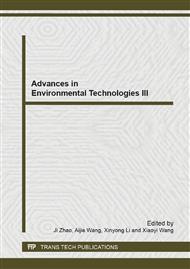[1]
Shen Qingji. Environmental impact assessment of planning and its response. Urban Planning, 2004, 28(2): 52-56.
Google Scholar
[2]
Tang Tao. Plan environmental impact assessment towards the goal of building an environmental-friendly society. Nankai University, Tianjin, (2007).
Google Scholar
[3]
National Development and Reform Commission. Notice on low-carbon province and low-carbon city pilot studies. http: /www. sdpc. gov. cn/zcfb/zcfbtz/2010tz/t20100810_365264. htm.
Google Scholar
[4]
Bai Hong-tao, Wang Hui-zhi, You Tian-rong, Xu He. Facilitating Low-carbon Development with the Strategic Environmental Assessment in China . Ecological Economy, 2012(6): 24-27, 33.
Google Scholar
[5]
Zhu Tan, Wu Jing. The application of environment impact assessment for planning in eco-city construction. Modern Urban Research, 2006, 21(1): 29-31.
Google Scholar
[6]
Wu Jing. Environmental Impact Assessment for Planning in the Ecocity Construction. Nankai University, Tianjin, (2006).
Google Scholar
[7]
Ji Yijun. Study On Application Of Circular Economy In Environmental Impact Assessment. Nankai University, Tianjin, (2008).
Google Scholar
[8]
Li Yan, Long Bingqing, Zhang Liqing et al. Study on recycling economy assessment in plan environmental impact assessment. Environmental Protection Science, 2007, 33(6): 119-121.
Google Scholar
[9]
Li Bosong. Study on Strategic Environmental Assessment of Urban Development Plan Based on Energy Decoupling Theory. Nankai University, Tianjin, (2010).
Google Scholar
[10]
Environment Change Institute, Strategic Environmental Assessment and Climate Change: Guidance for Practitioners. http: /www. environment-agency. gov. uk/research/policy/40121. aspx.
Google Scholar
[11]
Climate Change Mitigation and Adaptation - Impact Assessment Considerations/Approaches. http: /www. iaia. org/IAIAWiki/Default. aspx?Page=climate&NS=&AspxAutoDetectCookieSupport=1.
Google Scholar
[12]
Noble, B. F., Christmas, L. M. Strategic environmental assessment of greenhouse gas mitigation options in the Canadian agricultural sector. Environmental Management, 2008, 41(1), 64–78.
DOI: 10.1007/s00267-007-9017-y
Google Scholar
[13]
Lin Erda, Gao Qingxian. Integrating climate change into strategic environmental assessment. Green leaves, 2007, 12: 10-11.
Google Scholar
[14]
Ang B W, Zhang F Q, Choi K H. Factorizing changes in energy and environmental indicators through decomposition. Energy, 1998, 23(6): 489-495.
DOI: 10.1016/s0360-5442(98)00016-4
Google Scholar
[15]
Johan Albrecht, Delphine Francois, Koen Schoors. A shapely decomposition of carbon emissions without residuals. Energy Policy, 2002, 30(9): 727-736.
DOI: 10.1016/s0301-4215(01)00131-8
Google Scholar
[16]
Wang C, Chen J, Zou J. Decomposition of energy-related CO2 emissions in China: 1957-2000. Energy, 2005, 30: 73-80.
DOI: 10.1016/j.energy.2004.04.002
Google Scholar


